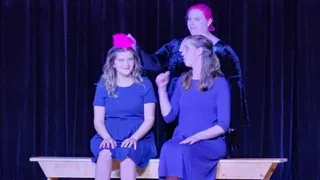December 13, 2021
Lincoln Center Theater's 'Flying Over Sunset' Hits Psychedelic Speed Bumps
Matthew Wexler READ TIME: 3 MIN.
During the 1950s, psychiatrists clinically administered lysergic acid diethylamide (LSD) to explore its benefits in treating mental health disorders from schizophrenia to past traumas long before "post-traumatic brain disorder" came into use. Even Hollywood stars, literary figures and Washington's political elite got in on the action. Three such prominent figures fictionally converge in Lincoln Center's Theater's new musical, "Flying Over Sunset." But this is an acid trip you'll likely soon forget.
Featuring a book by James Lapine, music by Tom Kitt and lyrics by Michael Korie, "Flying Over Sunset" imagines what might happen if leading man Carey Grant (Tony Yazbeck), writer Aldous Huxley (Harry Hadden-Paton), and socialite and political powerhouse Clare Boothe Luce's (Carmen Cusak) lives intersected under the influence of LSD.
They each have specific reasons for trying the drug, with common emotional tethers of longing, guilt and grief intertwined among them. Before administering Grant his first dose, a doctor asks, "What do you see as missing in your life? That's a very common feeling most people have at one time or another."
Though explored throughout each participants' sensory-bending experience, the question never raises the stakes high enough that the audience remains invested, regardless of the production's exquisite visual aesthetic.
Cusack, Hadden-Paton and Yazbeck get top billing, but it's the trifecta of Beowulf Boritt (sets), Bradley King (lighting) and Dan Moses Schreier (sound) – along with mesmerizing projections by 59 Productions – that salvage "Flying Over Sunset" into something remotely watchable.
Taking advantage of the Vivian Beaumont's vast stage, Boritt's segmented cyclorama fractures apart and reassembles in gliding sequences that transport the audience from Hollywood's famous Rexall Drug Store to a Beverly Hills psychiatrist's office to Booth's oceanfront, mid-century rental home in Malibu and beyond. And when things start getting trippy, King juxtaposes heavily cast film noir shadows with richly saturated hues, recalling the CinemaScope widescreen films of the era.
Schreier's sound design envelops the theatre, washing over the action with dynamic tracking as if you're wearing the newest pair of AirPod Pros. The acting company also gets in on the action thanks to Michelle Dorrance's percussive movement and choreography, which creates an atmospheric gauze for transitional moments, as well as an electrifying tap dance number as Grant confronts his younger self (Atticus Ware).
All of these rich details can't lift the deadweight of "Flying Over Sunset"'s book or score. Lapine's narrative remains burdened with stilted, of-the-era prose, while Kitt – whose contemporary scores for "Next to Normal" and "If/Then" extricate even the most complicated emotions – rarely finds an alluring melodic passage beyond the show's title song. Even Korie's lyrics feel contrived, such as when Aldous describes the Pacific as "the amniotic soup of life on earth" during a tumultuous LSD dip in the ocean.
For a more visceral examination of the impact of drugs on the human mind and soul, consider heading 20 blocks south to Alanis Morissette and Glen Ballard's "Jagged Little Pill" or tuning into Netflix's "Nine Perfect Strangers".
"Flying Over Sunset" aims for the sky but barely leaves the ground.
"Flying Over Sunset"
Lincoln Center Theater at the Vivian Beaumont
150 West 65th Street, NYC
Through February 6, 2022
Matthew Wexler is EDGE's Senior Editor, Features & Branded Content. More of his writing can be found at www.wexlerwrites.com. Follow him on Twitter and Instagram at @wexlerwrites.





